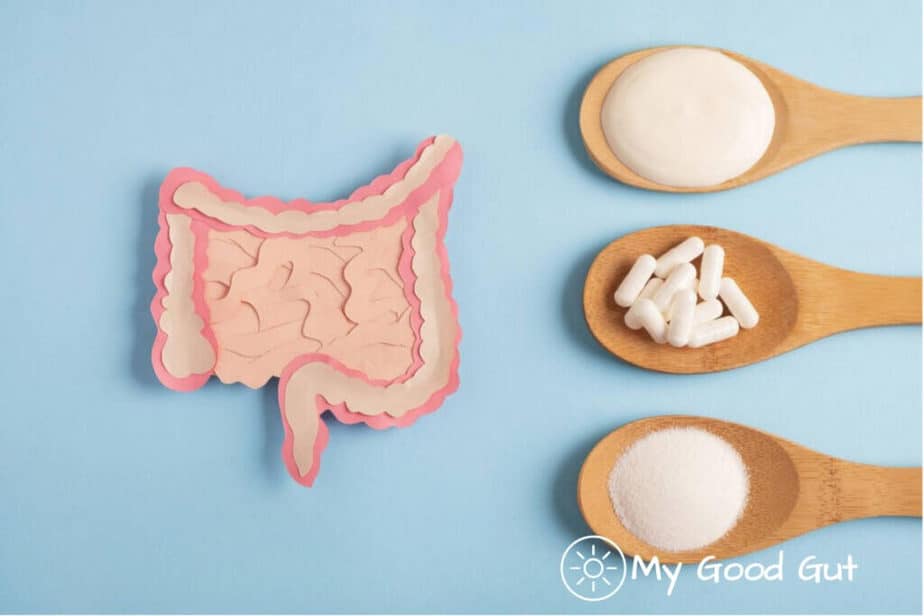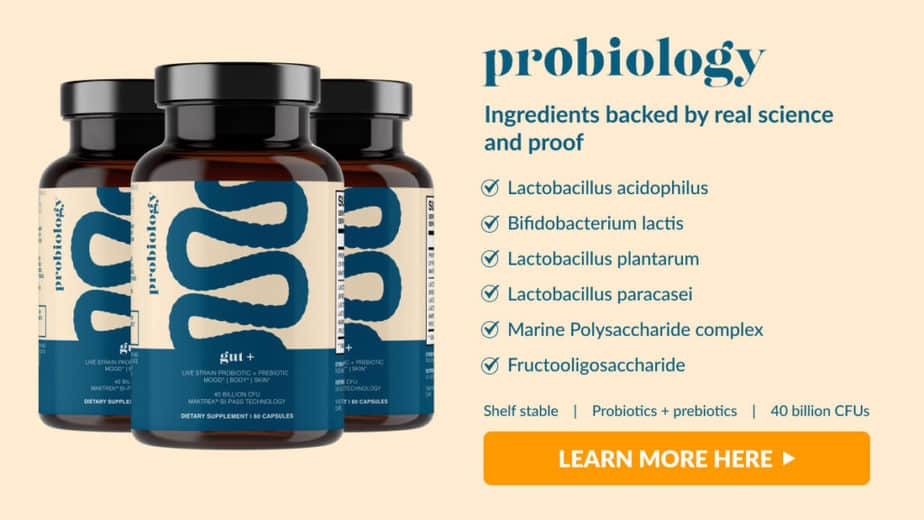Have you ever wondered if probiotics could be the secret to solving constipation issues? We’ll dive into the complex world of probiotics and their impact on digestive health. Imagine the intricate balance of good bacteria in your gut, working tirelessly to maintain your digestive system’s harmony.
This article will shed light on how these microscopic helpers could be key in easing constipation, a common problem affecting millions worldwide. We’ll examine various probiotic strains known to aid digestion and their specific actions in the digestive tract.
Whether it’s improving stool consistency or increasing the frequency of bowel movements, the potential benefits of probiotics are vast and varied.
If you’re someone battling constipation, a health enthusiast curious about gut health, or simply seeking natural remedies, this article is for you.

Everything You Need To Know About Probiotics and Constipation
Probiotics are great for easing constipation in people who are pregnant, children and any adult at any age! There are certain strains that can help food to pass through your digestive tract more quickly which means you can go to the toilet more often.
Some of them can also mean that the consistency is better so it doesn’t hurt as much to pass stool.
If you’re feeling constipated, you’re certainly not the only one. In fact, it has been estimated that around 14-16% of adults throughout the globe are constipated at any particular time.
This number can be even higher at 80% sometimes, though it really does depend on what you define as constipation.
Of course, how it’s defined doesn’t entirely matter – constipation feels pretty terrible.
Sure, you can take quick remedies like bulking agents, laxatives and stool softeners, but even then you still may not get the kind of relief that you want.
Taking probiotic supplements may be the answer to your prayers if you are struggling with constipation. They are a great choice to use as an adjunct to your standard interventions for constipation.
The good bacteria in your gut can do a lot of things to ensure that your digestion is back to the way that it is supposed to be.
How Does a Probiotic Supplement Aid with Constipation?
First of all, it can help to define what exactly constipation is. Constipation is defined as when you are passing stools on less than three occasions each week.
The stool may be lumpy or hard and bowel movements may be challenging to pass or could be causing you pain.
Having constipation every now and again can even put your digestive system out of whack. This is because there are waste products in the fecal matter and this can also include pathogens. If these pathogens stay around in your intestines, your gut microbiome can be affected.
Probiotics are helpful because they can help to ensure that there is healthy bacteria in your gut – especially Bifidobacterium and Lactobacillus.
This bacteria can do a few things, including creating short chain fatty acids in your colon.
These are good as they reduce the pH in your colon and help movement to occur. It can help you to feel like you want to pass stool. It also helps your colon to produce enough mucus to help you to pass stool.
It aids in metabolizing the bile acid salts in your intestines (which when impaired can contribute to altered bowel habits) and finally, it softens your stool which can help you to pass it more easily.
If I Have Chronic Constipation, Can Probiotics Be Useful?
Having irregular bowel movements every now and then can happen to all of us. It’s quite a different story if you are experiencing chronic constipation.
As it turns out though, chronic constipation is one of the most common complaints in the U.S. when it comes to digestive issues, and more than 92,000 people a year are hospitalized because of it.
You may be more likely to deal with chronic constipation if you are pregnant, older, dehydrated, don’t have enough fiber in your diet, if you have underlying health issues, if you are taking certain medications or if you are of a low socioeconomic status.
We still don’t fully understand functional gastrointestinal and bowel disorders and why they occur. With that being said though, researchers are quite convinced that people who experience them can benefit from taking probiotic supplements.
There is quite a bit of research designed to figure out what probiotics can do in order to reduce constipation and its associated symptoms.
The one problem is that probiotic supplements can differ depending on the product in question and thus, it can often be a challenge to come to a conclusion on the results on a large scale.
Some recent meta analysis has looked at around 14 different studies and concluded that there are some consistent results linking positive benefits of probiotics on constipation, however.
In particular, the bowel’s gut transit time was said to be increased by around 12 hours when an individual took probiotic supplements.
This is a pretty big deal as it means that food moves through your digestive system more quickly, resulting in more frequent bowel movements. Participants also found improved stool consistency and less bloating.
In essence, you are sure to find benefits to your constipation if you take probiotics, regardless of whether it’s chronic or an occasional issue. They are great for better gut health and they are proven to reduce digestive discomfort in general.
The Time It Takes for Probiotics to Work On Constipation
It can often be difficult to know how long it’s going to take for probiotics to work if you are constipated. It can depend on you as an individual and how you respond to the supplements.
It can also depend on what is causing your constipation. In most cases, it can take between four weeks and 3 months for the effects to truly kick in.
Most research does not tell you an accurate answer, but the vast majority of people say that they feel better within a couple of hours or days after they first start taking a great quality supplement.
There are also other things that you can do to help balance your gut microbiome to support the supplements, though this depends on why you are actually having the digestive issues to begin with.
For people that struggle with irritable bowel syndrome constipation, eating more fiber can be a very effective way to increase the frequency of your bowel movements. It will help to make your probiotic more effective and can put your digestion back in balance.
You can also increase the amount of physical activity that you have each week as this can help to keep your bowels effectively moving.
You are likely to experience fewer symptoms of constipation if you’re active. This may not be possible for everyone though.
Finally, always remember that probiotics aren’t just effective for digestion – they do a lot more than that. You may not immediately notice the effects on your constipation and digestion, but there’s a chance that you can start to see the benefits of the supplement in different ways instead.
Can Probiotics Assist You With Pooping?
You may find that you find it a lot easier to poop when you start taking probiotics. Not only that, but they are also great for encouraging healthy poop.
It can often be difficult to know what exactly ‘healthy poop’ is – in which case, have a look at the Bristol Stool Scale for reference.
The probiotics can change the balance of the microbes in your body, making more of the bacteria in your gut good rather than bad.
This can have a massive effect on your digestive system. It can help to keep your immune system in good working order, reducing the chances of infections that can cause problems for your digestion.
They have been proven to be effective for helping with symptoms of IBS, improving constipation, bloating, abdominal pain and diarrhea. They help to improve your digestive system, so this is hardly a surprise!
Learn more about which probiotics are best for IBS.
Finally, if your gut microbiome is full of healthy bacteria then it means that your body will find it easier to digest nutrients properly. Any bad bacteria is then removed thanks to regular bowel movements.
Things to Think About When Using Probiotics for Constipation
It’s only natural that you would want to take probiotics for your constipation, but it is vital that you think about any other potential things that could be adding to your problem. For instance, is there anything that you can do to increase the effects of the probiotics?
Some examples include improving your hydration and eating more soluble fiber. You can also increase your physical activity. Finally, speak to your doctor to see if there are any medications that may be adding to your constipation issues.
There’s a chance that they could find a different medication that you can take.
For most people probiotics are completely safe. With that being said, you should always speak to your doctor if you have any major health concerns and you are thinking about taking probiotics.
You will always need to check that they are safe for you and your particular condition.
It’s important to note that there’s a chance that you may feel some side effects for a short while after you begin taking your probiotic.
For instance, you may experience stomach upset, gas and bloating at first. It will usually go away after a couple of days, but sometimes it might not. In this case, you should reassess when you are taking the probiotic.
Most of the time it’s best to take these supplements when your stomach is empty, but it can be helpful to take them with your food as your body gets used to the changes.
Likewise, you can reduce how much you are taking and then increase the dose in small amounts as you go on.
Ensure that you aren’t allergic to any of the ingredients such as dairy for instance, or gluten. Finally, if you are still having problems then it’s worthwhile to think about using an alternative using other bacteria strains.
Can You Become Constipated from Taking Probiotics?
In most cases you shouldn’t experience constipation from taking probiotics, but everyone is different. As such, there’s always a chance that it may be something that you experience.
If you take Saccharomyces boulardii in large amounts, for instance, your digestion can slow down and this may not be ideal if you want to avoid constipation.
The vast majority of information out there says that probiotics are effective with increasing the movement of your gut.
With that being said, they are still living organisms that all act differently so there’s always a chance that results can vary. There’s no real way of knowing the reason why either.
In most cases it’s best to use a probiotic formula made with the specific strains and species that work for you in order to avoid potential negative side effects.
Best Probiotics for Constipation
If you are trying to find a probiotic for constipation, it is best to look for something that contains the strains known as bifidobacterium and lactobacillus. These are a few popular ones with those strains:
It can be helpful to find a probiotic supplement that contains a number of different strains of this bacteria.
If you are looking for a supplement, it is often best to stay away from ones that have dairy, yeast, gluten or soy in them since they can be common irritants, especially if your gut is already imbalanced.
These substances can disrupt the gut, which isn’t ideal.
Ultimately it’s best to look for a probiotic supplement that includes the ingredients that you need to encourage regular bowel movements.
Make sure that you do your research in order to ensure that you are making the right choice for you. The guidelines mentioned above should help you find a suitable product. With time, you should surely see some favorable results.

For more articles on probiotics, check these out:

